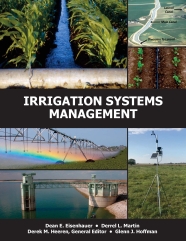 This open educational resource is available for free download. It is the culmination of course notes which have been in development and use for nearly 30 years. The notes from which this book was developed have been tried and tested, not just at the University of Nebraska-Lincoln (UNL), but also at other land-grant universities. A downloadable instructor kit is available for $200 purchase by emailing publications@asabe.org. A sample instructor kit may be freely downloaded.
This open educational resource is available for free download. It is the culmination of course notes which have been in development and use for nearly 30 years. The notes from which this book was developed have been tried and tested, not just at the University of Nebraska-Lincoln (UNL), but also at other land-grant universities. A downloadable instructor kit is available for $200 purchase by emailing publications@asabe.org. A sample instructor kit may be freely downloaded.
Our goal is for the reader to understand the complexities of irrigation systems and how
they are to be managed to meet the water needs of the crop production system. This is not an
irrigation engineering design book; we have purposely minimized the presentation of design
steps and the supporting equations. The intended audience of the book is upper-level undergraduate
students and graduate students who are pursuing degrees in agricultural or natural
resource sciences.
The emphasis of this book is on the management of irrigation systems that are used for
agricultural crop production. There are two distinct components of the book, starting with the
soil-water-plant-atmosphere system and how soil water should be managed to achieve the
desired crop production outcomes. This includes in-depth presentations on soil water storage
and movement, plant water use, managing the soil water reservoir through irrigation scheduling,
and salinity management. The book then shifts to the second component, which is the
description and management of the various forms of agricultural irrigation systems along with
their water supply. Whether it be a surface, sprinkler, or microirrigation system, the irrigation
manager must not only know how much water to apply but also how to manage the system
itself to achieve efficient application.
Development of this resource was supported by ASABE Foundation’s Harold Pinches and Glenn Schwab Teaching Materials Fund, the Daugherty Water for Food Global Institute, and the University of Nebraska-Lincoln.
Irrigation Systems Management is already being used at several universities across the world. Here is what instructors are saying:
- “I am so glad that you all took on the challenge of creating a much-needed resource.”
- “Thanks again...I designed my Principles of Irrigation Water Management course for students without any previous background on irrigation or hydraulics…and it has been challenging for me to find materials that fit the needs of my course.”
- “There is a lot of information that would be very beneficial to our students and for my class! Having this as a resource would be great.”
Find this and other ASABE Publications at https://doi.org/10.13031/ism.2021. Send feedback about this book to ism@asabe.org.
Citation
Eisenhauer, D. E., Martin, D. L, Heeren, D. M. & Hoffman, G. J. (2021). Irrigation Systems Management, ASABE. doi:10.13031/ISM.2021, CC BY-NC-ND 4.0, https://creativecommons.org/licenses/by-nc-nd/4.0/
Chapters
- Introduction to Irrigation
- Soil Water
- Measuring Water Applications
- Plant Water Use
- Irrigation System Performance
- Irrigation Scheduling
- Salinity Management
- Pump and Pipeline Hydraulics
- Water Supply Systems
- Surface Irrigation
- Sprinklers
- Moved Lateral and Traveler Sprinkler Systems
- Center Pivots and Lateral Moves
- Microirrigation
- Chemigation